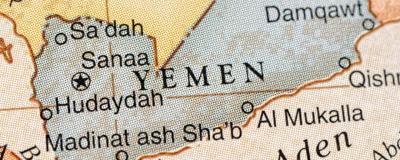A complicated Yemen conflict

Experts detail U.S. role in the violent power struggle
Once a dusty, largely forgotten country in the Persian Gulf, Yemen has seized center stage in Congress as lawmakers debate whether American military support for a Saudi-led bombing coalition in the country should continue.
On the heels of Saudi dissident Jamal Khashoggi’s October death at the hands of security forces of Saudi Crown Prince Mohammed bin Salman, lawmakers and policy analysts are questioning whether the United States should continue its military partnership with the Saudis in Yemen. With the Saudis, Iranians, Americans and Sunni and Shiite separatists all vying for power, it’s increasingly difficult to keep the players straight.
So how did we get here? The conflict in Yemen has roots in the Arab Spring movement of 2011, when protests in the country primarily against poor economic conditions and government corruption escalated to calls for the resignation of Ali Abdullah Saleh, an authoritarian ruler in power dating back to 1978.
In 2013, Saleh announced he would not run for re-election and passed the reins to his vice president, Abdrabbuh Mansur Hadi. With Al-Qaeda Islamic extremists threatening in the Arabian Peninsula and Houthi militants who had been waging a Shiite separatist insurgency in the mountains of north Yemen, Hadi was unable to unite the increasingly fractured political landscape of the nation. Under pressure from rebels to form a “unity government,” Hadi fled to Saudi Arabia in March 2015.
Since 2015, the Hadi government in exile has been fighting a vicious civil war against the Houthis, helped by a bombing campaign conducted by a U.S.-backed coalition led by Saudi Arabia. On the other side, the Houthi rebels are supported for ideological reasons by Iran, a majority-Shiite country.
The Saudi-led bombing campaign, sectarian fighting and starvation may have killed as many as 85,000 children, estimates international charity Save the Children, and tens of thousands of civilians. A U.N. report warns that millions in Yemen are on the brink of famine — including nearly 2 million “acutely malnourished” children — in what has become the world’s biggest humanitarian crisis.
As the violent conflict in Yemen continues to swirl, the Saudi-led bombing campaign against the Houthi rebels has been paused momentarily while both sides head to the bargaining table for United Nations-sponsored peace talks in Sweden.
With the situation in Yemen grabbing headlines across the country, we talked to a pair of Ohio State experts — Middle East Studies Center Director Alam Payind and Mershon graduate affiliate Austin Knuppe, a doctoral student in international relations — about how this conflict developed and where things might be headed in Yemen.

Q: How do you characterize the Yemeni conflict today? Is this fundamentally a civil war or a proxy war designed to stem Iranian influence?
Payind: It’s a civil war and a proxy war. There is a Shia and Sunni divide that is basically being exploited by Iran right now. In Afghanistan, many years ago, there was a conflict between the Muslims and the communists. Finally, the Soviet Union invaded and the United States supported the opposition, and this became an arena for the Cold War.
Yemen is becoming a smaller version of that with the Houthis (supported by the Iranians) and the Sunnis (supported by the Saudis). The fear, from the U.S. and Saudi perspective, is that this could become another Lebanon situation where Hezbollah (a Lebanese rebel group backed by Iran) became the king-maker.
Knuppe: It’s incredibly complicated. You have a civil war, a proxy war, and U.S. counter-terrorism operations against the Islamic State and Al-Qaeda in the Arabian Peninsula (AQAP). The U.S. is waging a drone war and special operations campaign as part of light footprint counter-terrorism strategy. This is probably three or four conflicts wrapped into one with all of them intimately related to one another.
Q: How critical to the Saudi-led bombing campaign is the help from the United States? Could the bombing campaign happen without our help?
Payind: If you don’t supply the spare parts (for the U.S.-made fighter jets), it becomes useless. The United States is providing assistance with spare parts, refueling, satellite tracking information and intelligence on the movements of troops and people through different areas. They are supplying not only parts and fuel, but critical intelligence.
Knuppe: The Saudis can’t wage a successful air operation without U.S. help. We are really essential to them continuing what they are trying to do (with the bombing campaign).
Q: The Senate recently held a 63-37 preliminary vote on a War Powers Act resolution that would attempt to end U.S. involvement in Yemen within 30 days of passage. Is this a pathway to changing U.S. foreign policy in Yemen?
Payind: Yes, because the United States is getting criticism not only from across the Middle East, but now is getting criticism in the Senate from both Republicans and Democrats. Should the United States look the other way when international norms and diplomacy are being trampled on by a person named Mohammad bin Salman? This is a huge issue, and one that will really haunt us and be a black spot internationally.
Knuppe: It’s an important first step. It could create some breathing space for humanitarian agencies to come forward and provide support. We have some leverage, so we need to increase the conditionality on the Saudis for our continued help. At least get them to be more discerning with their targeting during this bombing campaign.
One recent development has been a unique alliance between progressive critics and non-interventionist Republicans like Sen. Rand Paul. We’re seeing some movement in foreign policy that we haven’t seen since the aftermath of the Vietnam War.
Q: Is the recent interest from Congress in considering an end to the U.S. involvement in the bombing campaign a result of fallout from the murder of Saudi journalist and dissident Jamal Khashoggi?
Knuppe: I’d like to think so. But part of our problem is that the power to make foreign policy is so vested in the executive branch. Until Congress reasserts some of its constitutionally mandated powers, I don’t see a change. Trump has taken a very soft line on the murder of Khashoggi despite the U.S. intelligence reports that clearly indicate who was behind this.
Payind: Senator Bob Corker mentioned that if Mohammad bin Salman was in front of a jury, he would be convicted of being involved in this murder in 30 minutes. That, in a way, is a very convincing argument. Republican or Democrat, this should not be partisan politics. I do think the Khashoggi murder has given them (Congress) some backbone.
A U.N. report warns that millions in Yemen are on the brink of famine — including nearly 2 million “acutely malnourished” children — in what has become the world’s biggest humanitarian crisis.
Q: As much as the United States may abhor the destruction caused by the bombing campaign, are we forced to be involved in Yemen to counter the influence of the Iranians as the Trump administration suggests?
Payind: It should not drive us to do the same things that Iran is doing. If a country commits acts of terrorism, should the U.S. become terrorists as well to counter them? If a country is violating international law, that country should be punished, we shouldn’t join them.
Knuppe: We are creating more enemies and fundamentally undermining our counter-terrorism interests by supporting the Saudis as they wage an indiscriminate bombing campaign. The best way to counter the Iranians, in my view, is to step back and let the Yemenis decide whether they want Iran to stop meddling in their internal politics.
Q: Can the bombing campaign be ended and more peace brought to Yemen?
Payind: Somehow, there has to be ceasefire and the parties involved directly and indirectly pave the way for medicine and food to go to the people who are suffering. If there is a will, then I think the United Nations can use their considerable power to solve this crisis.
Knuppe: I think we have the leverage (to stop the bombing campaign), but is their will on the part of President Trump to exercise it? It doesn’t seem to be the case. I think the War Power Act resolution could provide some initial pressure, but I think it will be of limited effectiveness in changing Saudi behavior.
Q: Are you optimistic that U.S. policy will change course in Yemen, either because Congress forces changes or Trump decides on his own to take a new path?
Knuppe: Trump is very transactional, and he frames this in terms of support for the Saudis and concerns with Iran’s meddling as opposed to seeing this conflict as a Saudi responsibility. We’ve seen this approach before with negative results for the U.S. in places where they supported Arab autocratic regimes prior to the 2011 Arab Spring. Somehow we think that by doubling down here, we can get a different result.
Payind: To be honest, I don’t see the brave decision making that is needed from the executive branch to make a bold decision to avert the humanitarian crisis. Trump is looking at this like Iran is the big enemy and he’ll join Saudi Arabia in trying to destroy them.
Q: Where do you think we will be a year from today in Yemen? Is there a solution on the horizon?
Knuppe: I think the Saudi intervention will be more limited — the air campaign will no longer exist. The civil war between the north and the south, I don’t see a short-term end. The end game could be a partition; it could be the United Nations involved in a small-scale peacekeeping mission.
Q: Why should people who live on the other side of the world care about what happens in Yemen?
Payind: The world’s not separate anymore from one another. The U.S. economy is tied up in the economies of other parts of the world. We cannot live in the 21st century without having relationships with other countries. We are all interdependent. We have to get involved.
This article first appeared in Ohio State Insights.
